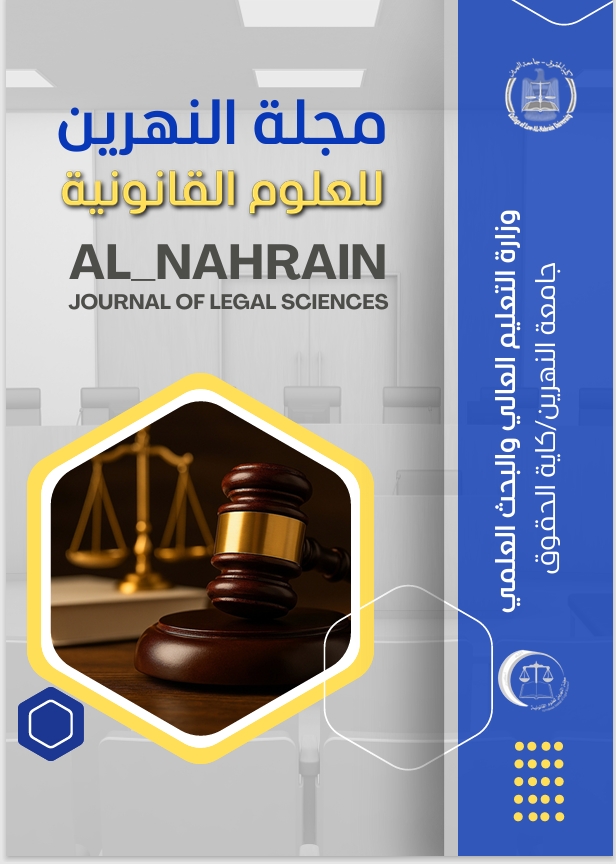Abstract
International humanitarian law, like any other law, includes a set of rules that require various measures to be taken, It relates to the means and mechanisms of putting it into practice, whether at the international or national level if the rule of ignorance of the law does not absolve the addressee from the obligation to abide by its provisions, and is not suitable for being a motive that clings to evade its application .
However, knowledge of the law, its dissemination and education is among the successful means to establish the doctrine of adherence to and respect for it outside the means of coercion and coercion. It is not the authorities of the state and its and its agents, including the national judge ,that are concerned with the application of international humanitarian law within the limits of the competencies entrusted to it as in other laws. In addition to these, all fighters present in the combat zone are considered “judges” in the figurative sense of this word, and they must know their duties and limits of their rights as “fighters” in relation to fighters of the enemy, their victims, and the protection and care decided by humanitarian law for them and for the protected persons and objects belonging to the enemy.
However, knowledge of the law, its dissemination and education is among the successful means to establish the doctrine of adherence to and respect for it outside the means of coercion and coercion. It is not the authorities of the state and its and its agents, including the national judge ,that are concerned with the application of international humanitarian law within the limits of the competencies entrusted to it as in other laws. In addition to these, all fighters present in the combat zone are considered “judges” in the figurative sense of this word, and they must know their duties and limits of their rights as “fighters” in relation to fighters of the enemy, their victims, and the protection and care decided by humanitarian law for them and for the protected persons and objects belonging to the enemy.
Keywords
الدول، القانون الدولي، الاحكام، التأهيل، المدنييون
Abstract
يتضمَّن القانون الدولي الإنساني كأي قانون آخر؛ طائفة من القواعد التي تقضي باتخاذ تدابير متنوعة تتعلق بوسائل وآليات توضع موضوع التنفيذ، سواءً على المستوى الدولي أم الوطني، إذ أنَّ قاعدة الجهل بالقانون لا تعفي المُخاطبين به من واجب الالتزام بأحكامهِ، ولا تصلح لأن تكون دفعاً يتمسك به للتنصل من تطبيقه، غير أنَّ العلم بالقانون ونشره وتعليمه هو من بين الوسائل الناجعة لترسيخ عقيدة الالتزام به واحترامه خارج وسائل الإكراه والقسر .
فليست سلطات الدولة ووكلائها بما في ذلك القاضي الوطني هي المعنية بتطبيق القانون الدولي الإنساني في حدود الاختصاصات المُناطة بها، كما في القوانين الأخرى. فإلى جانب هؤلاء يعد كل المقاتلين الموجودين في منطقة القتال (قُضاة) بالمعنى المجازي، وعليهم معرفة واجباتهم وحدود حقوقهم (كمحاربين) إزاء مقاتلي الخصم وضحاياه، وما يقرره القانون الإنساني لهم وللأشخاص والأعيان المحمية التابعة للعدو من حماية ورعاية .
فليست سلطات الدولة ووكلائها بما في ذلك القاضي الوطني هي المعنية بتطبيق القانون الدولي الإنساني في حدود الاختصاصات المُناطة بها، كما في القوانين الأخرى. فإلى جانب هؤلاء يعد كل المقاتلين الموجودين في منطقة القتال (قُضاة) بالمعنى المجازي، وعليهم معرفة واجباتهم وحدود حقوقهم (كمحاربين) إزاء مقاتلي الخصم وضحاياه، وما يقرره القانون الإنساني لهم وللأشخاص والأعيان المحمية التابعة للعدو من حماية ورعاية .
Keywords
Civilians
International Law
Judgments
Rehabilitation
States
